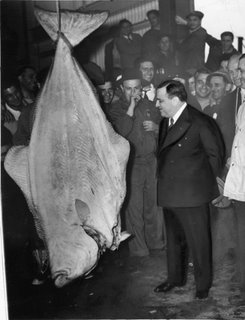
Monday, October 16, 2006
TRJ: Hallucinations
Totat Request Jive, or TRJ for short, is a weekly Friday feature where you the WordHumper reader decide which lucky word gets humped back to the stoneage (or at least to Proto-Indo-Europa). Alas, my roof was in danger of caving in this past Friday, so last week's TRJ was postponed until this morning. Today's word comes from RM in Walnut Creek who asks where the word hallucinate comes from.
Hallucinate is from a Latin root, hallūcinārī, hallūcināt- which means to dream or to be deceived. This verb, in turn, is a variant of ālūcinārī, meaning "to wander in the mind, talk idly, prate". The Online Etymology Dictionary adds: At least one person, Leo Rutherford, has the misconception that "'hallucinogenic' comes from the word 'hallowed'" and used this false etymology to bolster his justification for the use of hallucinogenic drugs in religious ritual. Mark Liberman at the Language Log did a nice job debunking this idea noting that the words do not share a common root, however halibut and hallow do (both are from the Indo-European root kailo meaning "whole, uninjured, of good omen"). Thus by Rutherford's logic he is
At least one person, Leo Rutherford, has the misconception that "'hallucinogenic' comes from the word 'hallowed'" and used this false etymology to bolster his justification for the use of hallucinogenic drugs in religious ritual. Mark Liberman at the Language Log did a nice job debunking this idea noting that the words do not share a common root, however halibut and hallow do (both are from the Indo-European root kailo meaning "whole, uninjured, of good omen"). Thus by Rutherford's logic he is
If you have a word you'd like humped because you're either too lazy or inept to do it yourself please email it, along with your location, to wordhumper. And in case you missed last week's TRJ check out Antonomasia.
hallucinate [OED]
Hallucinate is from a Latin root, hallūcinārī, hallūcināt- which means to dream or to be deceived. This verb, in turn, is a variant of ālūcinārī, meaning "to wander in the mind, talk idly, prate". The Online Etymology Dictionary adds:
...probably from Gk. alyein, Attic halyein "be distraught," probably related to alasthai "wander about." The L. ending probably was influenced by vaticinari "to prophecy," also "to rave." Sense of "to have illusions" is from 1652. Hallucination in the pathological/psychological sense of "seeing or hearing something which is not there" is first recorded 1646; distinct from illusion in not necessarily involving a false belief. Hallucinogen "drug which induces hallucinations" is first recorded 1954; hallucinogenic (adj.) in this sense is from 1952.
 At least one person, Leo Rutherford, has the misconception that "'hallucinogenic' comes from the word 'hallowed'" and used this false etymology to bolster his justification for the use of hallucinogenic drugs in religious ritual. Mark Liberman at the Language Log did a nice job debunking this idea noting that the words do not share a common root, however halibut and hallow do (both are from the Indo-European root kailo meaning "whole, uninjured, of good omen"). Thus by Rutherford's logic he is
At least one person, Leo Rutherford, has the misconception that "'hallucinogenic' comes from the word 'hallowed'" and used this false etymology to bolster his justification for the use of hallucinogenic drugs in religious ritual. Mark Liberman at the Language Log did a nice job debunking this idea noting that the words do not share a common root, however halibut and hallow do (both are from the Indo-European root kailo meaning "whole, uninjured, of good omen"). Thus by Rutherford's logic he is ...correct in supporting the use of halibut in religious rituals, but for magic mushrooms he'll have to look to other arguments.As for the photo on the right, you're not hallucinating; that's Fiorello LaGuardia inspecting a 300-pound halibut.
If you have a word you'd like humped because you're either too lazy or inept to do it yourself please email it, along with your location, to wordhumper. And in case you missed last week's TRJ check out Antonomasia.
hallucinate [OED]
:: posted by David, 8:03 AM